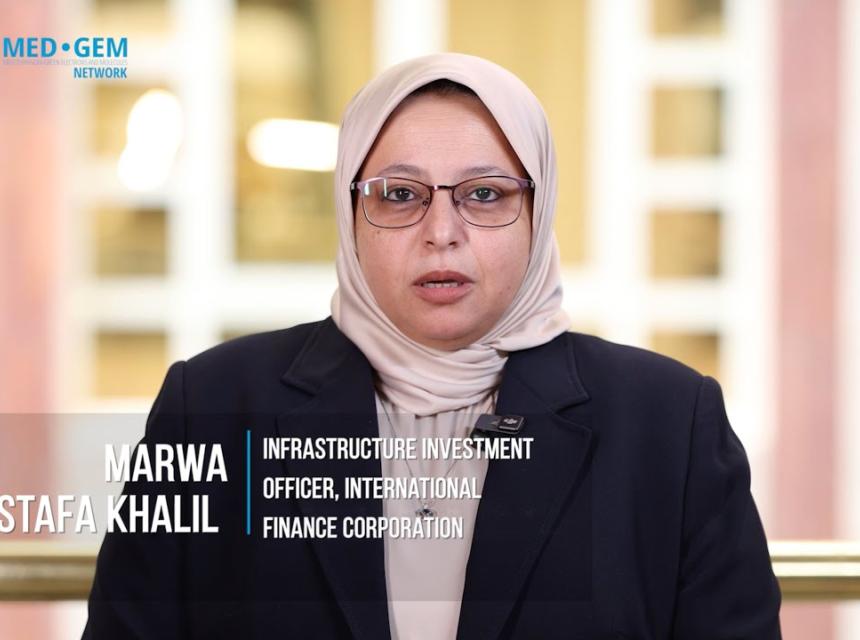How IFC is Paving the Way for Green Hydrogen Investments in Egypt: Insights from Marwa Mostafa Khalil
Last December 5, 2024, Policymakers, business representatives, and renewable energy experts gathered in Cairo for the National Consultation Workshop on Green Hydrogen, themed “Empowering Egypt: Fuelling the Future with Green Hydrogen Investments.” Organized by the EU-funded MED-GEM Network in collaboration with the European Union Delegation to Egypt and key Egyptian government entities, the workshop aimed to position Egypt as a global leader in the burgeoning green hydrogen economy. This event follows the EU-Egypt Investment Forum held in June 2024, where both parties committed to accelerating the transition to clean energy through joint investments, innovative policies, and enhanced partnerships.
Among the notable speakers was Marwa Mostafa Khalil, Infrastructure Investment Officer at the International Finance Corporation (IFC), World Bank. Mrs. Mustafa Khalil emphasized the critical role of early-stage financing and risk mitigation tools in fostering the development of green hydrogen projects in Egypt, a relatively new market for the country and the world.

🎤 Watch the interview | 🎬 Watch the full Documentary
Enabling Green Hydrogen Development in Egypt
The IFC, Mrs. Mustafa Khalil explained, is leveraging its extensive infrastructure and manufacturing expertise, supported by global and regional teams, to bring international best practices to Egypt’s green hydrogen initiatives. "Our main mandate is to finance infrastructure projects like green hydrogen," she stated, "but we also provide instruments to help de-risk these projects and bridge the gap until they become investment-ready. » Key tools offered by the IFC include:
- Regulatory Support: Ensuring legislative frameworks are conducive to project development.
- Feasibility Studies: Offering lenders’ perspectives early in the project lifecycle.
- Environmental and Social Scanning: Mitigating potential risks for long-term sustainability.
Egypt’s Progress and Challenges
Egypt has made significant strides in creating an enabling environment for green hydrogen development. Policies and infrastructure are already in place, and the institutional setup provides a strong foundation. However, Mrs. Mustafa Khalil noted that more work is required to ensure seamless collaboration between private developers and public entities.
“We need clarity on project pipelines, policies, timelines, and the dialogue between private developers and public entities,” Mrs. Mustafa Khalil said to MED-GEM Network. “It’s essential to allocate risks to the parties best equipped to manage them, whether public, private, or financiers.”
Currently, Egypt is at the early stages of implementing green hydrogen projects, with one pilot project in progress and more anticipated. Mrs. Mustafa Khalil stressed the importance of building a bankable framework early on, ensuring that projects align with international financing standards to attract investment.
A Comprehensive Approach
Mrs. Mustafa Khalil highlighted the need for a fully integrated and comprehensive solution to advance green hydrogen projects. “The IFC brings international experience, exchanges views, and provides insights on what we need to see for projects to be bankable,” she stated. This collaborative approach involves engaging all stakeholders—governments, private developers, international financiers, and public entities.
During the workshop, participants engaged in open discussions about policy frameworks, financing mechanisms, and the alignment of roles and responsibilities. Mrs. Mustafa Khalil praised the MED-GEM Network’s efforts in fostering such dialogues, describing them as a "vital platform for addressing challenges and finding solutions collaboratively."
The Road Ahead
As Egypt continues to build its green hydrogen portfolio, workshops like this one will play a critical role in maintaining momentum and refining strategies. Mrs. Mustafa Khalil expressed optimism about Egypt’s potential to lead the global green hydrogen market, provided that stakeholders remain committed to aligning resources and addressing challenges collectively.
“I look forward to joining future workshops and witnessing the launch of the next two, three, or four green hydrogen projects in Egypt,” Mrs. Mustafa Khalil concluded.
With its strategic location, established infrastructure, and increasing international collaboration, Egypt is well-positioned to become a powerhouse in the global green hydrogen economy, driving forward its clean energy transition.

